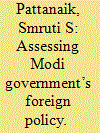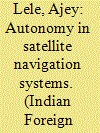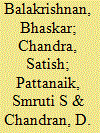|
|
|
Sort Order |
|
|
|
Items / Page
|
|
|
|
|
|
|
| Srl | Item |
| 1 |
ID:
136782


|
|
|
|
|
| Summary/Abstract |
‘Continuity’ has been a part of India’s foreign policy and a change in government can only bring in certain nuances in the conduct of that policy. The political environment that a new government brings in certainly creates some expectation from the government, but, any change in the foreign policy would be contingent upon a change in the strategic environment in which a state functions. Yet, the BJP led NDA government’s policy is keenly watched and there is an expectation that this government’s foreign policy would be different in style and direction, if not in substance.
|
|
|
|
|
|
|
|
|
|
|
|
|
|
|
|
| 2 |
ID:
136780


|
|
|
|
|
| Summary/Abstract |
India is developing an Indian Regional Navigation Satellite System (IRNSS) to provide itself and neighbouring countries with the Position Navigation and Timing (PNT) service. This project is likely to become operational by 2015. Initially, the system will have seven satellites, and the number will later go up to 11. IRNSS will be an independent 7 satellite constellation, built and operated by India with indigenous capability: three in GSO and 4 in non-GSO (inclined 29 degrees with equatorial plane). India has already launched three satellites of their constellation and one thereafter, thus making the initial phase of this system operational.
The IRNSS will provide an absolute position accuracy of approximately 20 metres throughout India, and within a 2,000 km region around it. The system is expected to provide two types of services: one for civilian use, and another as a restricted encrypted service for specific users.
|
|
|
|
|
|
|
|
|
|
|
|
|
|
|
|
| 3 |
ID:
136787


|
|
|
|
|
| Summary/Abstract |
The optimist views South Asia as a half-full glass while the pessimist views it as half-empty. The realist, however, drinks the water in the glass, and wisely quenches his thirst. If we remain stuck in a quagmire of despondency over runaway population growth, grinding poverty of a huge section of the population, and endless squabbles over historic wrongs, the future looks grim. But, if we think of the region as overwhelmingly youthful, charged with vitality and a can-do mentality, well-integrated into the global economy thanks to its large diaspora, brilliantly positioned between the energy rich West Asia and the manufacturing hub of East and South-East Asia, and fully committed to inclusive developmental goals, then South Asia can be the region of the future.
|
|
|
|
|
|
|
|
|
|
|
|
|
|
|
|
| 4 |
ID:
136786


|
|
|
|
|
| Summary/Abstract |
Evolving geopolitical realities are shaping the India-Japan relationship. While the ‘China threat’ theory and declining US influence in the region is making Abe explore alternatives like India, India is expected to pursue its quest for multi-polarity, great power identity, as well as pragmatically engage with all the important players in the fast altering security environment to ensure regional peace and stability so critical for facilitating development. Japan is vital in India’s Look East, Engage East, and Act East policies. Shared values and a convergence of interests in the post-Cold War era, as discussed earlier, has pushed the relationship from one of mutual reluctance to deep-rooted trust and cooperation.
|
|
|
|
|
|
|
|
|
|
|
|
|
|
|
|
| 5 |
ID:
136779


|
|
|
|
|
| Summary/Abstract |
The coming to power of a majority government led by the BJP and Prime Minister Narendra Modi opens up new possibilities in India’s foreign policy and external relations. India’s engagement with the outside world has lagged during the past five years, hamstrung by a weak coalition government preoccupied with managing internal cohesion and keeping afloat. This drift has been apparent in internal governance as well, with decisions on many key issues left dangling. The negative impact of this on economic growth, internal security and national morale has greatly diminished India’s role in the increasingly complicated and competitive global environment.
|
|
|
|
|
|
|
|
|
|
|
|
|
|
|
|
| 6 |
ID:
136784


|
|
|
|
|
| Summary/Abstract |
First few months of Narendra Modi Government has created a series of historical milestones in India’s engagement with the international community. Invitation to all SAARC heads of government for Prime Ministerial inauguration, first foreign visit by Prime Minister Modi to Bhutan, sudden postponement of an announced visit to Japan, while going ahead with a visit to Brazil to attend the BRICS summit, and spectacular summits with three major powers—Japan, China and the US are undoubtedly new and unprecedented historical moments in early months of any new government formation in India.
|
|
|
|
|
|
|
|
|
|
|
|
|
|
|
|
| 7 |
ID:
136783


|
|
|
|
|
| Summary/Abstract |
When the new government assumed office there was a general expectation, both within the country and outside, that there would be a new vigour in India’s foreign policy. Led by Narendra Modi, the new government did take steps to reinvigorate the external relations. While it is early to judge the intent and the outcome of the decisions taken so far, a trend can be easily identified.
Instead of analysing the efforts taken by the new government in terms of individual countries, it would be useful to identify the broad parameters under which the relationships are being pursued and their effectiveness. In this context, three distinct trends could be identified, in terms of strategies adopted by the new government – the core, outer core and the periphery. Rather than looking through the geographic prism of the immediate neighbourhood, the extended region and the rest, the relationships should be viewed based on their importance and impact.
|
|
|
|
|
|
|
|
|
|
|
|
|
|
|
|
| 8 |
ID:
136785


|
|
|
|
|
| Summary/Abstract |
India’s national well-being is heavily dependent on stability in the Gulf region of West Asia. Unfortunately, volatility here is going to continue increasing in the foreseeable future. Any major disruption of normalcy in the GCC countries would result in disastrous consequences for India. What is happening in Iraq and Syria must not spill over into the GCC countries. However, the unfortunate reality is that there is nothing that India can say or do to influence events on the ground. But the least that India can, and must, do is to convey through actions that we have a keen interest in a strong relationship with the GCC countries.
|
|
|
|
|
|
|
|
|
|
|
|
|
|
|
|
| 9 |
ID:
136781


|
|
|
|
|
| Summary/Abstract |
Prior to his becoming Prime Minister, there was, understandably, considerable uncertainty about the nature of Narendra Modi’s foreign policy and the manner in which he would conduct it. While some may have felt that it would be overly assertive, others may have believed that since he was a newcomer to the national scene, it would be diffident and tentative.
|
|
|
|
|
|
|
|
|
|
|
|
|
|
|
|
|
|
|
|
|